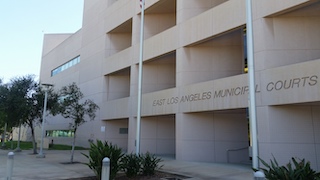The exceptions to the “no depositions” are that a “conditional examination” may be conducted before trial to preserve testimony if certain procedures are followed under Penal Code §§ 1335-1345. The exact procedure is set forth at Penal Code § 1336;
(1961) 190 Cal.App.2d 739, 12 Cal.Rptr. 191.
Either the prosecution or the defense can take a “conditional examination” in any non-capital case by showing that the witness’ testimony is, first, material to the issues of the case and second, that the witness is sixty-five years or older, so sick or infirm that the witness’ ability to testify at trial is in doubt, is about to leave the state, or is a dependent adult.
If the case is a serious felony, as defined under Penal Code § 1335(c), either the prosecution or the defense may have a material witness conditionally examined on a showing that the witness’ life is in jeopardy. Penal Code §§ 1335(b), 1336(b). A serious felony is any one of the felonies listed under Penal Code § 1192.7(c) or any violation of Health and Safety Code §§ 11351, 11352, 11378 or 11379.
The serious felonies listed under § 1192.7(c) include 42 crimes. They are murder, voluntary manslaughter, mayhem, rape, sodomy by force, oral copulation by force, lewd or lascivious act on a child under 14, any felony punishable by death or imprisonment in the state prison for life, any felony in which the defendant personally inflicts great bodily injury on any person, other than an accomplice, or any felony in which the defendant personally uses a firearm; attempted murder; assault with intent to commit rape or robbery; assault with a deadly weapon or instrument on a peace officer; assault by a life prisoner on a non-inmate; assault with a deadly weapon by an inmate; arson; exploding a destructive device or any explosive with intent to injure; exploding a destructive device or any explosive causing bodily injury, great bodily injury, or mayhem; exploding a destructive device or any explosive with intent to murder; any burglary of the first degree; robbery or bank robbery; kidnapping; holding of a hostage by a person confined in a state prison; attempt to commit a felony punishable by death or imprisonment in the state prison for life; any felony in which the defendant personally used a dangerous or deadly weapon; selling, furnishing, administering, giving, or offering to sell, furnish, administer, or give to a minor any heroin, cocaine, phencyclidine (PCP), or any methamphetamine-related drug, any violation of subdivision (a) of Section 289 (sexual penetration) where the act is accomplished against the victim's will by force, violence, duress, menace, or fear of immediate and unlawful bodily injury on the victim or another person; grand theft involving a firearm; carjacking; any felony offense, which would also constitute a felony violation of Section 186.22; assault with the intent to commit mayhem, rape, sodomy, or oral copulation, in violation of Section 220; throwing acid or flammable substances, in violation of Section 244; assault with a deadly weapon, firearm, machinegun, assault weapon, or semiautomatic firearm or assault on a peace officer or firefighter, in violation of Section 245; assault with a deadly weapon against a public transit employee, custodial officer, or school employee, in violation of Sections 245.2, 245.3, or 245.5; discharge of a firearm at an inhabited dwelling, vehicle, or aircraft, in violation of Section 246; commission of rape or sexual penetration in concert with another person, in violation of Section 264.1; continuous sexual abuse of a child, in violation of Section 288.5; shooting from a vehicle, in violation of subdivision (c) or (d) of Section 12034; intimidation of victims or witnesses, in violation of Section 136.1; criminal threats, in violation of Section 422; any attempt to commit a crime listed in this subdivision other than an assault; any violation of Section 12022.53; a violation of subdivision (b) or (c) of Section 11418; and any conspiracy to commit an offense described in this subdivision.
These are fairly common crimes and for these crimes, a conditional examination should be considered by defendant to preserve the testimony, if possible, of defense witnesses.
In our experience, we have seen the prosecution take the conditional examination of an older victim that was an alleged victim in a sex case. The examination was in the courtroom during the afternoon, after the morning calendar had concluded.
For more information about discovery issues, please click on the following articles:
- If Child Witness Refuses to Testify, 6th Amendment Violated?
- Will the Prosecutor Dismiss the Domestic Violence Case If the Victim Will Not Testify or Appear at Trial?
- I Got a Subpoena; Am I Too Far Away? Do I Get Witness Fees?
Contact us.  East LA Courthouse
East LA Courthouse